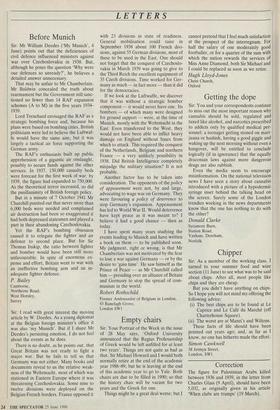LETTERS Before Munich
Sir: Mr William Deedes (`My Munich', 4 June) points out that the deficiencies of civil defence influenced ministers against war over Czechoslovakia in 1938. But, although he poses the question 'Why were our defences so unready?', he believes a detailed answer unnecessary.
That may be unfair to Mr Chamberlain. Mr Baldwin concealed the truth about rearmament but the Government still sanc- tioned no fewer than 14 RAF expansion schemes (A to M) in the five years 1934- 1939.
Lord Trenchard envisaged the RAF as a strategic bombing force and, because his plans were based on bombing cities, British politicians were led to believe the Luftwaf- fe would have the same aim; but it was largely a tactical air force supporting the German army.
The RAF's enthusiasts built up public apprehension of a gigantic air onslaught, possibly to secure funds against the other services. In 1937, 150,000 casualty beds were forecast for the first week of war: by 1939, the figure had expanded to 750,000. As the theoretical terror increased, so did the pusillanimity of British foreign policy.
But in a minute of 7 October 1941 Mr Churchill pointed out that never more than 6,000 beds were needed and complained air destruction had been so exaggerated it had both depressed statesmen and played a part in their abandoning Czechoslovakia.
Yet the RAF's bombing obsession caused it to relegate the fighter and air defence to second place. But for Sir Thomas Inskip, the ratio between fighter and bomber would have been still more unfavourable. In spite of enormous ex- pense and effort, Britain went to war with an ineffective bombing arm and an in- adequate fighter defence.
P. Bailey
Camborne, Northcote Road, West Horsley, Surrey










































































 Previous page
Previous page